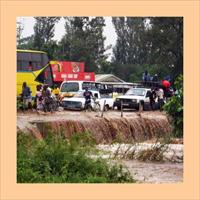KENYA: Floods displace thousands in northeast

More than 10,000 people have been displaced by flash floods following heavy rains that pounded Mandera in north-eastern Kenya and southern parts of Somalia this week, aid agencies said.
Kenya Red Cross Communications Officer Titus Mung'ou said that food and non-food items had been provided to families from an estimated 1,500 households that were displaced by the water that has been flowing across Mandera district in the past two days.
"We have a team on the ground; they have assessed the situation and established that at least 10,000 [people] have been uprooted from their homes, 426 toilets destroyed, and three schools are not accessible; they are flooded," Mung'ou said in an interview with IRIN.
He added that the affected families are in need of urgent medical assistance to prevent an outbreak of water-borne disease, and that food supplies are running short.
“We require at least 10,000 tonnes of food, but at the moment only 1,300 tonnes of rice are available for those who are homeless and are camping some four kilometres away from the town," Mung'ou appealed.
Heavy rains pounded Mandera district late on 14 October after months of severe drought causing heavy floods that displaced dozens of families and massive destruction of houses and business premises. It is feared that two people drowned.
Local residents and leaders said that more than 200 families from Bulla Mpya, Jamhuri and Boys Town villages were displaced overnight. The government has deployed a team of army personnel to help assist those displaced.
The floods have forced more than 300 students at Mandera secondary school to leave the premises. They have been relocated to a nearby primary school; some are thought to have lost their belongings.
Abdullahi Hussein, an elder who spoke to IRIN, said that more than 100 small kiosks - largely operated by women - were swept away by the floods taking with them vital stocks and cooking utensils.
"Owners of small kiosks that are lined across the stream are the hardest hit. They have all lost their goods, personal items, and are all out of business.”
Hussein added that most of the families have now gone to stay with relatives, but that they now urgently need water, shelter and food, and require help to be resettled and to restart their businesses.
He condemned the government for reacting too slowly to the disaster.
"These people were displaced last night and this morning. They are yet to be assisted and only a few have [received] food. They need more assistance," he stressed.
Dahabo Daud, from Mandera Women for Peace, said many families have been deprived a source of income, and added that it was painful that the tragedy has hit the district after months of severe drought.
Ismail Adam, a local farmers’ representative in Mandera, said that all farms in Lamagala and Sufti areas were destroyed, and expressed fears that residents will be unable to harvest essential crops that support almost half the local population.
"We were very happy when it started to rain last night, but our joy has now become a moment of mourning; we have lost two people, all [farm] houses have been damaged, and we need food relief."
 Back and Next - Back and Next
Back and Next - Back and Next See Also - See Also
See Also - See Also